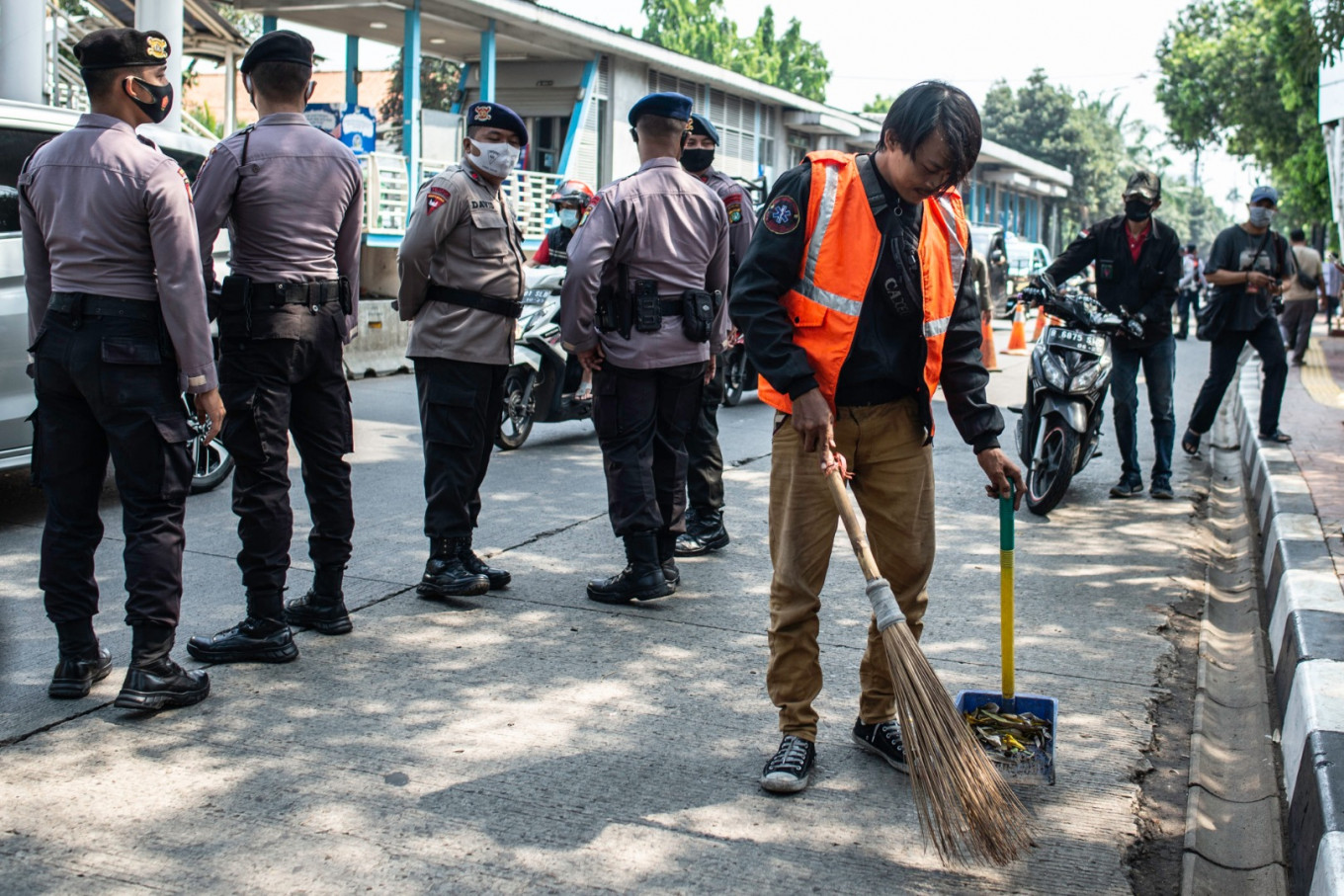Popular Reads
Top Results
Can't find what you're looking for?
View all search resultsPopular Reads
Top Results
Can't find what you're looking for?
View all search resultsPSBB are a work in progress, need constant review
The Jakarta administration needs to implement clear guidelines on imposing the second phase of large-scale social restrictions (PSBB).
Change text size
Gift Premium Articles
to Anyone
I
ndonesia lacks experience in managing a massive pandemic like COVID-19, therefore the large-scale social restrictions (PSBB) currently in place in Jakarta are an experiment that is subject to constant assessment and revisions from health experts.
Jakarta Governor Anies Baswedan reinstated the PSBB on Sept. 14, and extended them until Oct. 11, after seeing a drastic rise in infection cases during more than three months of relaxation.
In terms of clarity, the PSBB need reviewing. The gubernatorial decree on PSBB part two, for example, stipulates that “businesses are allowed to open at x percent of normal capacity”, which is somewhat vague. It is difficult to define the “ideal capacity” of a workspace.
If the workspace was overcrowded before COVID-19 struck and has poor ventilation, then reducing capacity by 50 percent may still be insufficient. The city administration also relies on honest reporting by industry players of “normal capacity”.
As a comparison, the Australian guidelines are much more explicit and specific, i.e. 1 person per 4 square meters. It is easy to comprehend and it is coherent with the public health messaging. Better comprehension usually leads to better compliance.
Now more than ever, we need to implement clear guidelines. This is so that citizens can feel more protected, business owners can feel more confident in running their companies, and it leaves no grey areas for officers auditing the businesses.
Another deeply concerning aspect of the current PSBB is the relaxation of the travel ban in and out of Jakarta. The long-term goal of PSBB is to quickly identify and isolate those infected through massive testing.
Keeping Jakarta's borders open will disturb this crucial process. A resident can leave the city when PSBB starts, and return when it ends, potentially carrying the virus. Other inbound and outbound travelers may also continue to spread infection between cities. So, there needs to be some kind of regulation at the border, during and beyond PSBB.
The policy to isolate patients with mild or no symptoms at hotels is an ambitious one, given our limited resources. Instead, we could have transformed the available property into makeshift hospitals to cater for the overflowing patients with moderate to severe symptoms.
The current PSBB, if extended for the third time soon, should also focus on enforcement of health protocols and minimizing the city’s traffic.
According to Iwan Ariawan, a biostatistician at the University of Indonesia, we need to make sure that at least 60 percent of Jakarta's population stay at home, and for those who don’t, at least 85 percent of them comply with the protocols.
That will be a Herculean task, especially given that the ongoing PSBB are substantially more relaxed than the old ones which were in effect between April and June.
We can also rely on the public to report any breach of the health protocols.
The viral video footage of cyclists clogging the bridge near Pantai Indah Kapuk 2 housing complex, West Jakarta, recently is one good sign of the public participation in enforcement of the protocols.
The city government-sponsored app Jakarta Kini (JAKI), which enables the public to report violations of the protocol anonymously, is also a great idea, given Indonesian people’s tendency to avoid conflict whenever possible. The Jakarta administration needs to promote the app on as many social media platforms as possible.
The use of GPS tracking through mobile phone apps to facilitate contact tracing, as happens in South Korea and Taiwan, is worth considering. The apps can also be used to track people who need self-quarantine.
Lastly, learning from the backlash that followed the reinstatement of PSBB, the restrictions should be decided based on outcome, rather than time. When infections are more controlled, we can relax the restrictions one at a time, pause each time to assess the impacts of the change, and duly decide whether to proceed or retreat.
A statement like “We will relax the non-essential office ban if the numbers decrease to so and so…” will be better received than “We plan to revert back to the new normal in 2-3 weeks, but we are not sure whether that’s going to happen”.
Setting common goals will bring people together and give them something to work toward. Such a gentle yet motivated approach will be less shocking to the financial market, avoiding retaliations. We need to learn to tiptoe around the giants.
-- The author is the general manager of PT Winida Ayu Lestari, with a PhD degree in medicine from the Department of Epidemiology and Preventive Medicine in the Faculty of Medicine, Nursing and Health Sciences at Monash University, Melbourne. The views expressed are her own.










